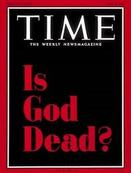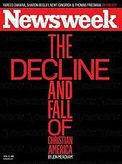
The April 8, 1966, cover of Time magazine was the first cover in the magazine's history to feature only type, and no photo.[4] The cover – with the traditional, red border – was all black, with the words "Is God Dead?" in large, red text. The question was a reference to Friedrich Nietzsche's much-quoted postulate "God is dead" (German: "Gott ist tot"),[5] which he first proposed in his 1882 book The Gay Science.
(quoted from Wikipedia)

Not only has the number of Americans who claim no religious affiliation nearly doubled since 1990, the Northeast, formerly the "home base" of American religion, has emerged in 2008 as the new stronghold of the religiously unidentified. In addition, many conservative Christians believe they have lost the battles over issues such as abortion, school prayer and even same-sex marriage, and that the country has now entered a post-Christian phase.
(quoted from Reuters)
So, because you are lukewarm, and neither hot nor cold, I will spit you out of my mouth." (Rev. 3:15-16, ESV)
These words were written to the church of Laodicea. Laodicea is a compound word--laos (people) + dicea (rights, or justice).
Some have taught that the letters to the seven churches represent seven different church ages or emphases. One could argue, then, that we are certainly in the Laodicean Church Age where all around us we hear the clamor for "my rights."
The problem, however, is not exclusive to the world or non-Christian, for it is a favorite argument of many believers--especially here in the United States. I hear on a regular basis such things as, "I have a right to be angry," or, "I have a right to be happy," or, "I have a right to want more money," or, "I have a right to want to get married," or, I have a right to.....(fill in the blank"). All one has to do to elicit such a defense is to quote a passage of scripture that might challenge such a notion.
That leads many to believe that the person may claim to believe the Bible, but they have no intention of living by it.
Mega-churches are established today on the message of "you have a right to..." (whatever good thing yore li'l ol' heart desires)
The church today has reached room temperature. Rigor mortis is not far away.
(Of course, you may be able to point to your church and say this is not true. I won't argue with that. I am speaking of a general trend, not specific situations. Someone will always find an exception to any rule.)
I attended a church-planters conference a few years ago. It was hosted by a denominational church. That particular denomination had recorded 1600 new church plants the previous year--for a net gain of one. Fortunately, they were ashamed of their numbers.
Too often we hear only one side of any number--the good side:
- We planted 1600 new churches last year!! That is awesome!
- We baptized 112 people last month!! That is awesome!
- We had 8 families join the church last week!! That is awesome!
Almost all polls of the past four decades have shown a steady decline in the number of people who attend church at least weekly. There has also been a steady decline in the number of people who claim any sort of religious affiliation. They are now known as a new demographic group called the "Nones."
"Alan Cooperman, associate director of research for the Pew Forum, says, the increase in Nones is "among men and women, among those who don't have a college education as well as those who do. There's as much increase at the lower income level as at the higher. And it is changing all across the country. It's not only in urban areas or on the coasts."
It's the change of a lifetime. When today's Baby Boomers were under 30, about 15% were Nones. They still are today. Among the 32% of Millennials who are Nones now, few will return to the organized religion fold, Pew researchers say." (USA Today)
I've been in mainline denominational churches in the northeast that were built to seat 300 or more people. Great, expansive, impressive works of architecture of a bygone era. On a Sunday morning, there may be 30 people huddled together with their overcoats tightly pressed against them to keep warm. There is no way that 30 people, most of them on fixed retirement income, can afford to pay the heating bills for a building that was built with no thought of insulation.
While it may be true that the decline of city churches could be blamed on the suburbanization of America, it should be noted that many of their denominational friends who moved to the suburbs also attend churches running at 10% or less of capacity.
Church attendance is down.
The decline will soon reach critical mass where a turn around is no longer possible. Many will see that as a time to "abandon ship."
Someone like me comes along every time there is a new survey revealing the decline of the Christian Church, wringing their hands and sounding the alarm. We begin to look for new ways to appeal to this "lost and dying world who, without Jesus, are miserable and on their way to hell."
Nope.
Not me.
This is good news!
I believe we are at an unprecedented time in the history of the church. As an erstwhile, not-so-diligent student of Church history, I base this statement strictly on my own opinion. My opinion is based on my own observations. So, one could rightly say that this is a self-centered, meaningless statement that flies in the face of all current wisdom.
Maybe you might be interested in my observations, which inform my opinion.
- The church is a stage, and its leaders merely players (thanks to livinhope) People get plenty of entertainment throughout the week, most of it of a high-quality nature. They do not see a need to get up early Sunday morning to go somewhere to be entertained by a bunch of wannabe's.
- Since the Jesus People Movement and the Charismatic Renewal of the late 60s and early 70s, most church growth has been by what I call adoption--people coming over to our playhouse to play with our new toys. There has been very little in the way of conversion from non-belief.
- Church services of the past five decades have followed the pattern of the past five centuries. The Protestant Reformation gave us the format we cling to so tenaciously: predictability. Church bulletins, with their "Order of Service," vary only slightly from one group to another. The general outline is the same, however: singing, offering, preaching--all sprinkled profusely with prayers asking God to bless our mess. There is no expectation of the unexpected--ie, boredom.
We cling to this and justify it with only one obscure verse: "Let all things be done decently and in order." (1 Cor. 14:40) - The number of denominations and independent churches continues to expand. Each time a new church is formed, it is usually on the basis of some "new revelation," or upset with the status quo. The beauty of this is that all these churches teach or emphasize something different from the others. Taken as a whole, this is a whole lot of confusion. (Babylon means confusion)
- The church is not God.
(to be continued...)
Comments, questions, and criticisms are welcomed here. Please add to the discussion by giving yours. Thank you.

 RSS Feed
RSS Feed